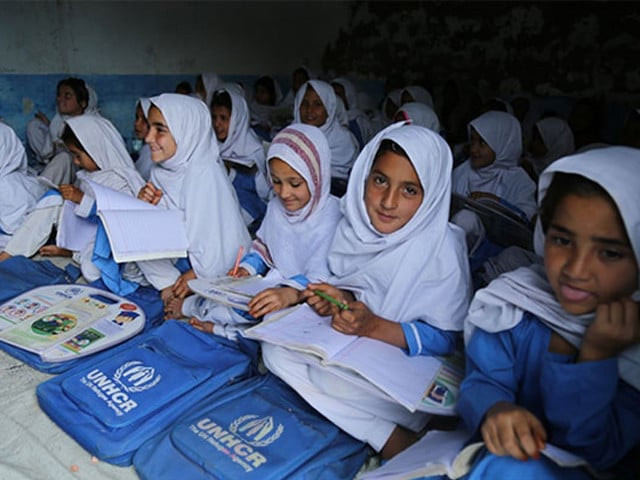As Pakistan intensifies efforts to deport illegal immigrants, Afghan refugee children find themselves in the crossfire, facing uncertain futures and jeopardised access to education.
Pakistan has embarked on a massive deportation campaign targeting Afghan refugees residing in Pakistan without legal documentation. The Afghan government directs all incoming Afghan refugees from Pakistan to settle in Jalalabad. Meanwhile, the Taliban administration has announced the establishment of a commission tasked with offering essential services such as temporary housing and healthcare to returning Afghan citizens, but this surge in refugees poses a significant challenge for local authorities in Jalalabad to accommodate the students within their existing local education system.
On the other hand, the Pakistani government cites concerns over national security and economic strain, but this crackdown raises serious questions about the educational prospects of thousands of Afghan children. Education is not only a fundamental human right but also a key driver for future stability and prosperity. Security concerns must be addressed, but it is crucial to approach these challenges with a compassionate lens, recognising the positive impact of education in fostering personal growth, regional stability, and prosperity.
A considerable portion of these young individuals have known no other home than Pakistan, with a significant number being born and raised here. For them, Pakistan has been a sanctuary, offering a chance at education and a brighter future. According to UNHCR statistics, approximately 57,000 refugee children were enrolled in 153 schools, 48 satellite classes, 55 home-based girls' schools, and 13 early childhood education centres in Pakistan. A number of Afghan families in Pakistan have crossed the border from Afghanistan seeking educational opportunities for their daughters in response to the Islamic Emirate's prohibition on schools for female students in grades 7-12 within Afghanistan. It underscores the urgency of creating environments that nurture learning and empower individuals, irrespective of geopolitical boundaries. As complex challenges are faced by both nations, it is imperative to explore comprehensive solutions that address security issues without compromising the well-being and future opportunities of vulnerable populations, especially children.
The educational curriculum in Pakistan and Afghanistan differs significantly. It's worth noting that the curriculum in some educational institutions in a few migrant settlements aligns with that of Afghanistan's educational system. The Pakistani curriculum uses English as the medium of learning for all subjects except Urdu language and Islamic studies, while the Afghani curriculum uses Pashto or Dari as a medium. Most of these deported students, born and raised here, and not well-versed in Pashto or Dari, will face significant challenges in their learning. One proposed basis for this effort is the establishment of joint educational programmes, fostering collaboration between Pakistan and Afghanistan to create integrated learning environments. These programmes aim to seamlessly merge elements of both educational systems, facilitating cultural exchange and easing the transition for displaced students. Resource-sharing initiatives, including the exchange of educational materials and the development of standardised curricula, are pivotal in mitigating the impact of educational disparities.
Similarly, implementing tele-schooling from Pakistan and establishing embassy schools in Afghanistan emerge as potential solutions. Collaboration between local authorities and NGOs is essential for enhancing educational infrastructure, expanding facilities, and ensuring access for displaced children. In addition, community-based support systems can play a crucial role in providing holistic assistance and fostering a supportive environment for the children and their families. Flexible education policies accommodating diverse linguistic and cultural backgrounds will further aid the integration process, ensuring inclusivity and adaptability for displaced students.
In an effort to address the educational needs of Afghan students and contribute to raising the literacy rate in the neighbouring country, the Higher Education Commission (HEC) Pakistan has recently launched the 'Allama Muhammad Iqbal Scholarships for Afghan Students (Phase III)' programme. This initiative provides approximately 4,500 scholarships for Afghan students over four years. However, addressing primary and secondary schooling is still a challenging issue which requires the urgent need for a coordinated, regional approach to refugee issues.
International organisations such as UNICEF and UNESCO play a crucial role in addressing the educational needs of displaced Afghan children. Initiatives, including establishing temporary learning centres and comprehensive teacher training programmes, tailored to primary and secondary levels, can provide accessible and safe spaces for continued education. These organisations can leverage networks and resources to supply essential educational materials, fostering a quality education despite displacement. Through these combined strategies, a comprehensive and flexible approach is envisioned to safeguard the educational continuity and well-being of Afghan refugee children.



COMMENTS
Comments are moderated and generally will be posted if they are on-topic and not abusive.
For more information, please see our Comments FAQ